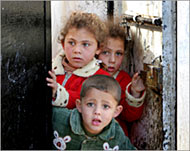UN: Palestinian refugees at a crossroads
Four million Palestinian refugees are at a “crucial juncture” following decades of dashed hopes and flagging aid, which might turn the increasingly young population into “gun-slinging militants”, a senior UN official has warned.

After reaching and sometimes exceeding regional standards for education and health, the refugees “are now sliding towards the bottom”, Peter Hansen, head of the UN agency dealing with the Palestinian refugees, UNRWA, said.
“The Palestinian refugee population is at a crucial juncture,” Hansen told delegates from 67 countries attending a conference in the Swiss city of Geneva, which is examining ways of reviving support for the refugees.
With progress in health care, one-third of the refugees are now under 14 but growing violence in the region and declining socio-economic support mean that Palestinian youngsters are confronted with two basic role models they could follow.
“There’s that of the hooded, gun-slinging militant, or that of the modern young computer whiz,” Hansen explained.
“Will it be pride in achievement or pride in destruction? Will it be self-confidence and tolerance, or cynicism and bigotry?”
“The youth bulge can be an opportunity, under the right conditions. Or it can be an enormous handicap under the wrong conditions,” he added.
Most of the refugees, scattered around the West Bank, Gaza Strip, Jordan, Lebanon and other Middle Eastern countries, are heavily dependent on UNRWA, which provides health care, education and economic development.
But it received less than half of its $196 million emergency funding last year, which is meant to deal with the impact of violence, curfews and closures in the territories, according to UNRWA.
Increased need
 |
|
One-third of refugees are |
Of the overall $438 million budget pledged last year – which also fell short of target – 25% was funded by the United States, and about 55% by west European countries or the EU Commission. A similar shortfall is emerging this year.
The number of Palestinians in Gaza and the West Bank relying on the agency for food aid has risen from 130,000 to 1.1 million since September 2000, according to the UN.
That largely coincided with the resurgence in violence in the Israeli-Palestinian conflict and the collapse of the peace process.
The organisers, UNRWA and the Swiss government, had already announced that the conference was designed to swap ideas and not to pledge money, and the agency appeared well short of filling its financial hole.
On Tuesday, the Organisation of Petroleum Exporting Countries (OPEC) Fund announced a $2.5 million (two million euros) contribution to some UNRWA financial programmes, and there was little sign of further funding expected from Gulf countries.
Switzerland promised about two million Swiss francs ($1.6 million). Canada, Australia and New Zealand also came up with additional cash while Japan announced that about five million extra dollars were in the pipeline.
Rafah appeal
|
“The youth bulge can be an opportunity, under the right conditions. Or it can be an enormous handicap under the wrong conditions” |
Officials from some European countries said they were ready to grant new money, but largely declined to say how much.
The United States reiterated that it would only come up with more if it felt that “other countries are doing their share”, US Assistant Secretary of State Arthur Dewey said.
The two-day conference, which was held behind closed doors, steered clear of political issues, although they are intertwined with the humanitarian plight of the Palestinian refugees.
UNRWA launched another $16 million appeal last week to help hundreds of Palestinian families made homeless by the Israeli army’s campaign of mass house demolitions in the southern Gaza Strip town of Rafah.
The total number of Palestinian refugees has grown from 950,000 in 1950 to about four million today, adding to the aid burden.